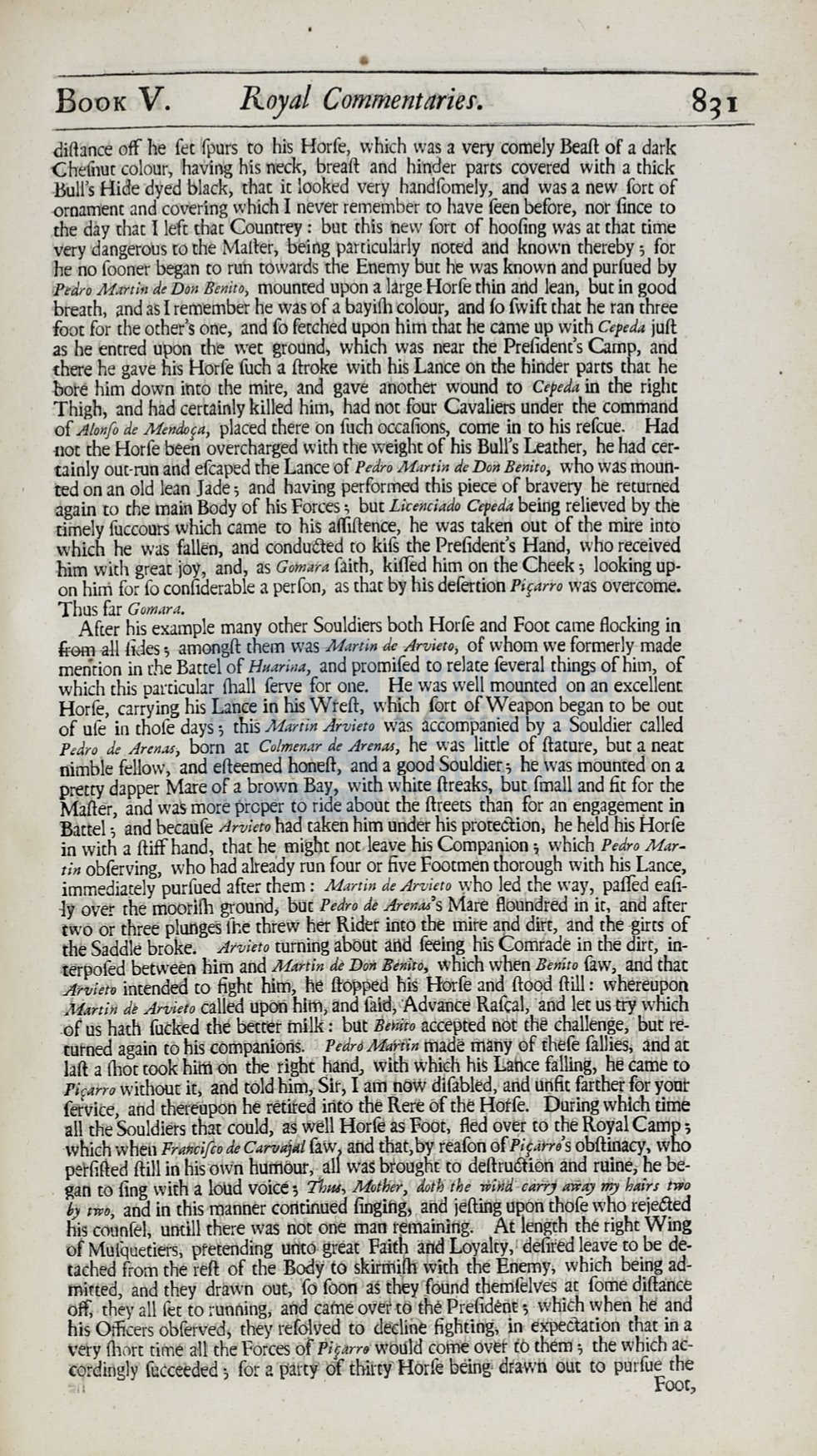

BooK
V.
Royal
Commentariéf.
<lillance
0ff
:fue fec !fpurs ro his Horfe, whrch was a very ·cornely Beafi: of a dark
-Ghefnac
colour, lhavir)g
Ms
,n'eck, breaU añd hin:der parés covered with a thick
-Billfs
tiile ·dye-d 'black, thac ic iooked very handfornely, and was
a
new forc of
-0mam'enc and coverrng whioh
I
never teme·mbet ro have feen before, nor fince to
,cfue day ~hac
I
lefc chac 'Councre:y :.bue chis new forc of hooftng wás at thac time
very •<ilanger0\J's
r©
l!he Ma!ler,
'b-ei!'rg
'párrícularl.y noced ar:td known chereby ; for
he nofoonet began co
n1h
cowards che Enemy bue he was known and purfued by
iPnJ.roMartin de Don ·iffenitoi
mounred upon a1!árge Horfe thin and leah, bue ín good
-brearh, andas I rem'ember he was
nf
a bayifh'colour, and
fo
fwift chac he tan chree
fooc for che 0cheti-s @ñe, and
fo
fet<1líed Upon iiitn diac
he
carne up wich
Cepeda
juíl:
.as he encretj
'upbA
tht= wec ·grouhd\ which was n'ear che Prefideric's
Camp,
and
~here
be gave
Ms
Hmfe fuch ,a frroke wi'ch
bis
Lance on che hinder pares chac he
-ll><lll:é
hím
down it1rr0 che mire, an~ gave .rn@thet wound
to
Cepedá
in
che righc
Thigh,
and
fuad
cerbi:iAIY killed him, had
nm
füur Cavaliers under che cotnrnand
of
Alonfo de Meñdop1.,
placed chere bn fach 0ccafions, come in to his refcue. Had
-11@c che Horfe b€en overcharged with che W'eighc of his Bull's Leather, he had cer–
tainly ouc-run
ahd
efcap'ed the Lante ~f
Pearo Martín de DonBenito,
who was moufi–
ted on an 0ld lean Jade ; and having performed chis piece of bravery he returned
,again
10
che
maitt
fürdy of hís Forces ; bue
Li'r:enciado Cepeda
beilig relieved by che
tünely fucrnurs which carne to his affiílence, he was taken out of the mire into
which he wa'S fallen, and c0ndu'é'ted co lí:ifs che Preftdent's Hand, who received
-him wich gr-eac
j0'9'.,
and, as
Gorm1ra
faith, kiífed him on che Cheek; looking up–
on him for
fo
confiderable a perfon, as thac b")7 his defertioh
Pífarro
was overcome.
Thus far
Gomara.
After his example many other Souldiers both Horfe and Fooc carne flocking
in
á:em -a-11 fües ; ilmong{t chem was
Marún de Arvieto;
of whom we formerly rnade
menrion in rhe Bactel of
Huarina,
and prornifed to relace feveral chings of him, of
which chis particular {hall ferve for one. He was well mounced on an excellenc
Horfe, carrying his Lan€e in
bis
Wtefr, whTch forc ofWeapon began co be out
of ufe inchofe days ; chis
Ma-rrin Arvíeto
was ~ccornpanied by a Souldier called
Pedro.deArmM;
boro ac
Colmenar de ArmM,
he was litcle of fiature, bue
a
neac
nimble fellow, and eíl:eemed honeft, and a good Souldier; he wa-s mounred on
a
p~ccy dapper Mare of a brown Bay, wich whice (treaks, bue frnall and
fic
for che
Mafier, ánd was·moré proper to ride abouc che fireecs chaq for an engagemenc in
Bactel ; and becaufe
Arvicto
had caken him undér his ¡;,rocecl:ion, he held his Horfe
in wich a fiiffhand, chat he migbt noc.leave his Cornpanion; which
Pedro Mar–
tín
obferving, who had altea'dy run four or five Footmen thorough with his Lance,
immediately purfued after chem:
M artín de Arvieto
who _led che way, paífed eaft-
1y
OV€!:
che mbbt-Uh ground; büt
Pedro
de
J1rma/s
Mare ffüühflred in ir, anti afcer
twb
ór three pJufiges
Íhe
threW
her
Ridet iñ{ó the mire and dií'~, ánd che -girrs of
the Saddlé broRe.
Atviuo
rurning ab5Ut
at\tl
feeíng his Gomfadé in che dirt, in–
-t~rpo[éd between
füm
afld
Maffin de Don lNnfto,
Which wh~n
B~mto
faw, and that
.:YJrvie-?o
intendeti
to
fjghc hit\í; h~ íl'ó~~ed Ms· Hórfi anti íl:ootl fiill: wñ~teú~oo
Martifl
de
Arvieto
called
Upoo
hllfl,
and faíd~·A9va-nte Raf,al,
·and
lec us-tfy which
.óf
lis hach futk:ed dlé betn¼f
tnílU :
but
Biñ'i't'o
adcepteél
nM
fh~ cthallénge,
l)uc
re–
l!lltned again
t®
~i~
a0mpánroñs.
PétlritMtiFtin
lftalfo
fü~tiy
~f
fli
[e
falli~,
:índ at
1aa
a
fhoc cook',füm
-dn
the
tight ~ána~
with whi~h
his
naAce falling,
fi@
éame to
l'i~arro
WithÓUC' it, afiid tóld him,. Sif;
l
afil
_11GJW
difablt!d,
1
añ~
úrJfit
fatthef
fer
yóot
fetttité, ahd ch€téáplfü hé retire€! into
die
Reré
0f
che H0tfe.
D
ring whic'h time
tdl tlie Souldi@rs th~t could,
~
~tfü
H0ffd
ás
Fóót,
fled
ov~r éo che Royal Canip;
·Whiah wli~11
Fr;'1hcifao de Carvajkt
ÍáW{
attd
tnat,
by,
tfafon
eÍIPifarro's
obíl:irlaq, who
perfüte~ íl:iH ió'ttis·óWri lilfrflour,-,.ál was br011ght' to
aefirut.ffiéb
ahd ruiné, he be-
. ~ari ((:) ífag wifH
á
lótid vóké;
71nu,-Mot1feí',
il.otli the
rM!t.l.'=oarrj
aiidy
my
hairs
trio
/;~
two,
an~ in díis ·wanher corttiñ~~~
fingifl~',
¡,a~él.
j~fü.tag
úp6~
.~ha(~
w~o reje~e~
h1s
couníel, untill tHere
yvas
ridt
one man terr1am1fig. Af leng~h rhé nghc Wmg
of
Mulquetiefsi pre~éhdfüg ütk(H!h~at
Fétith
artd
Loyalty,
1
épfüé'd
leave co be dé–
ta11:h@éi from che refl: of ch@
Booy•té
sk;itmiíli
wtich thé Ene.m·y; which beirig ad'–
m\i'tt~0, and chey drawn ouc;,
'fo
foon as @~yrfudqd tHemfélves ac
fomé
difüiñce
tlff,
rhey ali fec to rlmñing, aqd carné ovt!"tt~ t~é.Pn2fideiW ; -wli,ifü when he and
his Omcers obfütVéd
tliey refól1Je8
to
életline,fígf.ifihg\
in,
é
pec1atión that in a
very fhort
timé'
a,Hche Pórces·of-
Pifhml
wclútli
cbm'e ov'ef
ib
thérn'; che whiéñ at–
t0r~iñgly
faccl!!eaed ;
for a'patcf
~f
thihy'Morfo
Theing
1
éifawh
out
to pórfue the
1
·
Foo~














